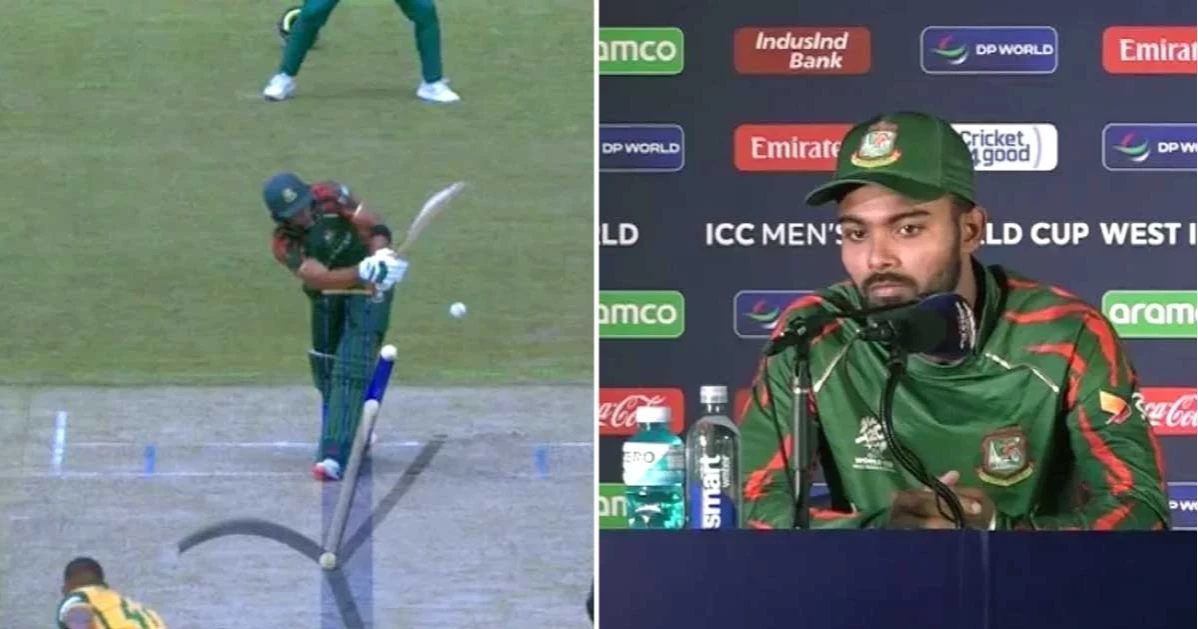The T20 World Cup 2024 clash between South Africa and Bangladesh will be remembered as one of the most thrilling yet controversial matches of the tournament. Held on a tense Monday evening, the encounter saw South Africa narrowly edge out Bangladesh by a mere 4 runs. The match, filled with high drama and intense cricketing action, took an unexpected turn due to a contentious umpiring decision that denied Bangladesh a crucial boundary, ultimately altering the game’s outcome.
Bangladesh’s Strong Position Undermined
Bangladesh entered the final stages of their chase needing 27 runs from the last 4 overs, a task that seemed within their grasp. Mahmudullah and Towhid Hridoy were at the crease, steering their team towards what could have been a remarkable victory. The duo had been playing with great composure, and the Bangla Tigers were optimistic about their chances. However, the match’s pivotal moment came in the 17th over, which turned the game on its head.
The Controversial Incident
In the 17th over, Mahmudullah attempted a flick off a delivery, only for the ball to hit his pads and race to the boundary behind the stumps. South African players, appealing vigorously for an LBW, saw the umpire raise his finger, signaling Mahmudullah’s dismissal. The ball was immediately deemed dead. Bangladesh, confident of their stance, opted for a DRS review, which revealed that the ball would not have hit the stumps. Consequently, the umpire reversed his decision, ruling Mahmudullah not out.
The Dead-Ball Rule’s Impact
Despite the decision reversal, the boundary scored off the leg byes was not credited to Bangladesh’s total. According to the ICC rules, once the umpire signals out and the ball is deemed dead, any subsequent runs, other than a no-ball penalty, are nullified. This rule meant that the four leg byes, which could have significantly influenced the game’s outcome, were not awarded to Bangladesh.
This incident highlighted a loophole in the rulebook, sparking outrage among fans and cricket experts. The four runs, had they been awarded, would have reduced the target and possibly changed the match’s dynamics, especially in such a tightly contested scenario.
Social Media Reactions
The decision quickly became a hot topic on social media, with several prominent figures voicing their opinions. Former Indian cricketer Wasim Jaffer was among the many who expressed disappointment, stating that Mahmudullah had been a victim of a loophole in the rulebook. “Mahmudullah was wrongly given out LBW, the ball went for four leg byes. The decision was reversed on DRS. Bangladesh didn’t get the 4 runs as ball is dead once batter given out, even if wrongly. And SA ended up winning the game by 4 runs. Feel for Bangladesh fans,” Jaffer posted on X.
Understanding the ICC Rule
The ICC rule in question, 3.7.1, states that if an original decision of out is changed to not out following a player review, the ball is still deemed dead from the moment the original decision was made. This means that any runs that might have accrued following the umpire’s call are not counted. This rule is based on Law 20.1.1.3 of the Dead Ball law, which asserts that a ball becomes dead the instant a batter is dismissed. Despite the reversal of the dismissal, the initial decision’s impact remains.
The Game’s Final Moments
After the controversial incident, the match continued with South African bowlers maintaining pressure on the Bangladeshi batsmen. Bangladesh needed 15 runs from the final over, a challenging but not impossible task. The tension was palpable as the last over unfolded, but South Africa held their nerve, preventing Bangladesh from reaching the target and securing a 4-run victory.
The Broader Implications
This incident has reignited discussions about the fairness and clarity of cricketing rules, especially in high-stakes matches like the T20 World Cup. While rules are essential to maintain the game’s integrity, this episode demonstrates the need for periodic reviews and potential amendments to ensure they are applied fairly and logically.
Moving Forward: Lessons for Cricket
The controversy surrounding the South Africa vs. Bangladesh match serves as a crucial reminder of the sport’s complexities and the need for continuous improvement in its regulations. For Bangladesh, despite the heartbreak, the match showcased their fighting spirit and potential. For the ICC and the broader cricketing community, it underscores the importance of clarity and fairness in rule enforcement, ensuring that such controversies are minimized in the future.
A Match to Remember
The T20 World Cup 2024 match between South Africa and Bangladesh will undoubtedly be remembered for its intense drama and the critical umpiring decision that played a pivotal role in its outcome. As cricket continues to evolve, so too must its rules, ensuring the game remains fair, competitive, and free from controversies that can overshadow the players’ performances and the sport’s spirit.
Please check for information on the best betting sites in India and IPL betting sites – https://selectory.org/best-betting-sites/
Related posts:
 Aaron Finch picks Virat Kohli’s batting position for the T20 World Cup 2024
Aaron Finch picks Virat Kohli’s batting position for the T20 World Cup 2024
 ‘If i don’t get a chance…,” Shubman Gill opens up on selection ahead of India’s T20 World Cup squad announcement
‘If i don’t get a chance…,” Shubman Gill opens up on selection ahead of India’s T20 World Cup squad announcement
 England unveil 15-man squad for T20 World Cup 2024; Jofra Archer returns
England unveil 15-man squad for T20 World Cup 2024; Jofra Archer returns
 T20 World Cup 2024: South Africa announces 15-member squad; no place for Temba Bavuma
T20 World Cup 2024: South Africa announces 15-member squad; no place for Temba Bavuma
 Fraser-McGurk and Smith left out of Australia’s T20 World Cup squad, Marsh to captain
Fraser-McGurk and Smith left out of Australia’s T20 World Cup squad, Marsh to captain
 Delhi Police hilariously trolls Pakistan after India’s thrilling win over Pakistan; tweet goes viral | T20 World Cup 2024
Delhi Police hilariously trolls Pakistan after India’s thrilling win over Pakistan; tweet goes viral | T20 World Cup 2024
 T20 World Cup: Here’s how Pakistan can still qualify for the Super 8 stage even after losing to India
T20 World Cup: Here’s how Pakistan can still qualify for the Super 8 stage even after losing to India
 Shraddha Kapoor, Ananya Panday & other Bollywood celebs rejoice India’s T20 World Cup win over Pakistan
Shraddha Kapoor, Ananya Panday & other Bollywood celebs rejoice India’s T20 World Cup win over Pakistan
 T20 World Cup 2024: Controversial umpiring decision leaves Towhid Hridoy frustrated after Bangladesh’s narrow loss to South Africa
T20 World Cup 2024: Controversial umpiring decision leaves Towhid Hridoy frustrated after Bangladesh’s narrow loss to South Africa
 PAK vs CAN, T20 World Cup: Match Prediction, Dream11 Team, Fantasy Tips & Pitch Report | Pakistan vs Canada 2024
PAK vs CAN, T20 World Cup: Match Prediction, Dream11 Team, Fantasy Tips & Pitch Report | Pakistan vs Canada 2024
 T20 World Cup: Cricket experts erupts over dead-ball rule after Bangladesh lose to South Africa
T20 World Cup: Cricket experts erupts over dead-ball rule after Bangladesh lose to South Africa
 Shahid Afridi blasts Pakistan for their humiliating defeat against India at T20 Word Cup 2024
Shahid Afridi blasts Pakistan for their humiliating defeat against India at T20 Word Cup 2024
 Stafanie Taylor leads West Indies to series-clinching win over Pakistan in 2nd Women’s ODI
Stafanie Taylor leads West Indies to series-clinching win over Pakistan in 2nd Women’s ODI
 Rajasthan Royals players thank Jaipur crowd after their last match at the Sawai Mansingh Stadium
Rajasthan Royals players thank Jaipur crowd after their last match at the Sawai Mansingh Stadium
 Pakistan legend Bismah Maroof announces retirement from international cricket
Pakistan legend Bismah Maroof announces retirement from international cricket
